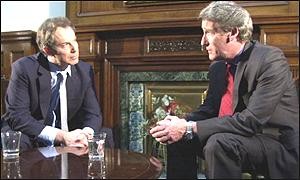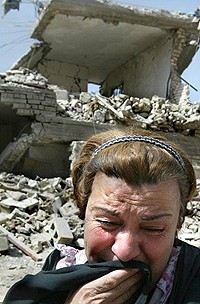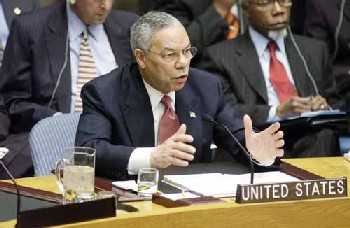|
Unlike his U.S. counterpart,
Britain’s Prime Minister Tony Blair comes under constant
fire for his role in taking the nation, kicking and
screaming, to war with Saddam Hussein. With the allies’
failure to find the Iraqi dictator’s fabled weapons of
mass destruction - which we now know from the Iraq
Survey Group (ISG) report were destroyed in the early
1990s - and the debunking of Saddam’s supposed links to
Osama bin Laden by the 9-11 Commission, the British
people are wondering in ever increasing numbers just
what their soldiers are doing there.
Such is the
British outrage a group of backbench members of
parliament have dredged up an antiquated law for the
purposes of impeaching Tony Blair for “High Crimes and
Misdemeanours in relation to the invasion of Iraq”.
In a report
entitled ‘A case to answer’, commissioned by Adam Price
MP, evidence is presented to the effect Blair
deliberately distorted intelligence assessments in order
to deceive the British public and Parliament over the
case for war.
Furthermore, the report alleges the Prime Minister’s
actions have destroyed the British government’s
reputation for honesty around the world; damaged and
discredited the intelligence services, and undermined
the constitution by weakening the cabinet, and making a
mockery of Parliament as representative of the people.
This
article studies various discrepancies between what
Western leaders said before the invasion and what we
know to be true today, and leaves it to the reader, to
decide whether there is, indeed, a case for Tony Blair
to answer.
Blair in the hot seat
On February 6, 2003, Jeremy Paxman
and a panel of ordinary members of the public
interviewed Tony Blair on the BBC’s Newsnight in the run
up to war. It proved to be a gruelling experience for
the Prime Minister squirming in the hot seat. Here are
just a few of the questions along with Blair’s fudged
answers:
Jeremy
Paxman:
…you said of those UN resolutions and the sanctions,
which followed them in the year 2000, that they had
contained him [Saddam]. What’s happened since?
Tony Blair:
I didn’t actually. I said they’d contained him up to a
point and the fact is…”
Jeremy Paxman:
I am sorry Prime Minister – “we believe that the
sanctions regime has effectively contained Saddam
Hussein in the last ten years”, you said that in
November 2000.
(My note:
On May 15, 2001 U.S. Secretary of State Colin Powell
also said while testifying before a Senate
Appropriations Committee: “The Iraqi regime militarily
remains fairly weak. It does not have the capacity it
had 10 or 12 years ago. It has been contained.”)
Tony Blair:
Well, I can assure you I’ve said every time I am asked
about this, they have contained him up to a point and
the fact is the sanctions regime was beginning to
crumble. It is why it’s subsequent in fact to that quote
we had a whole series of negotiations about tightening
the sanctions regime but the truth is the inspectors
were put out of Iraq so…
Jeremy
Paxman:
They were not put out of Iraq, Prime Minister. That is
just not true. The weapons inspectors left Iraq after
being told by the American government bombs will be
dropped on the country.
(My note:
On December 14, 1998, the day after inspectors quit Iraq
on the say-so of the U.S., America launched Operation
Desert Fox)
Jeremy
Paxman:
…when a great world figure like Nelson Mandela
calls the British Prime Minister the American Foreign
Minister, don’t you feel embarrassed?
Tony Blair:
I’ve huge respect for Nelson Mandela. But I do not feel
that I am doing the wrong thing and I may not be doing
the easy thing but I do believe I am doing the right
thing.

During the
interview, Blair insists that a decision still had not
been taken to go to war and any such decision would
depend on Saddam Hussein contravening UNSC Resolution
1441 by severely obstructing the work of the UN weapons
inspectors, headed by Hans Blix and Mohammed ElBaradei.
In such event, he promised there would be a second
resolution explicitly authorising an invasion.
As we now
know, Blix and ElBaradei asked for more time to carry
out their inspections after praising the cooperation
received from the Iraqi regime and were turned down.
As for
Blair’s commitment to a second resolution, this was not
to be. Instead, the U.S., the U.K. and Australia,
leading a coalition of mainly bribed and coerced smaller
states lit up the skies over Baghdad during ‘Operation
Shock and Awe’ in March, 2003. They couldn’t wait any
longer. They had to get their metal-clad troops into
Iraq before the unforgiving summer heat set in.
Secret pact
In reality, Blair’s decision to
back George W. Bush’s militarily toppling of Saddam
Hussein had been taken nine days after the terror
attacks on September 11, 2001. That secret pact sealed
in April 2002 during Blair’s visit to the President’s
ranch in Crawford Texas was acknowledged by a headline
in the Daily Mail, which screamed ‘Poodle Blair prepares
for Iraq War’.
Sir
Christopher Meyer, the former British Ambassador to
Washington is quoted thus in an April 4, 2004 article in
The Observer. “According to Sir Christopher Meyer…who
was at the dinner when Blair became the first foreign
leader to visit America after 11 September, Blair told
Bush he should not get distracted from the war on
terror’s initial goal – dealing with the Taliban and Al-Qaeda
in Afghanistan.
“Bush replied by saying: ‘I agree with you, Tony. We
must deal with this first. But when we have dealt with
Afghanistan, we must come back to Iraq.’
“It was
clear, Meyer says, ‘that when we did come back to Iraq
it would not be to discuss smarter sanctions’. Faced
with this prospect of a further war, says Meyer, ‘Blair
said nothing to demur’.”
Meyer’s
admission corroborates the account of former U.S.
‘terrorism tsar’ Richard Clarke, who before the 9-11
Commission described Bush as being obsessed with Iraq
post-9-11.
Bush’s Iraq
obsession was also substantiated by Bob Woodward’s book
‘Plan of Attack’. Woodward maintains that beginning
late December 2001 Bush repeatedly met with U.S. General
Tommy Franks and his war cabinet to plan the U.S. attack
on Iraq, even as he and his administration spokesmen
publicly insisted they were pursuing a diplomatic
solution. War, they said, was the last option.
Woodward
describes Vice President Dick Cheney as a “powerful,
steamrolling force” leading the advocates for war within
Bush’s administration, saying Cheney had developed ‘a
fever’ about removing Saddam by force.
Another
former administration member Treasury Secretary Paul
O’Neill subscribes to this assessment. Describing events
at President Bush’s very first National Security Council
meeting, he says: “From the very beginning, there was a
conviction that Saddam Hussein was a bad person and that
he needed to go. Going after Saddam was top ‘A’ after
the inauguration – eight months before September 11.”
O’Neill was surprised that nobody at that meeting saw
fit to ask ‘Why Saddam?’ and “Why now?’
Former Wall
Street Journal reporter Ron Suskind in his book titled
‘The Price of Loyalty’, based on interviews with O’Neill
and other officials at that meeting, says there was a
secret memo circulated headed ‘Plan for post-Saddam
Iraq’ covering peace-keeping troops, war crimes
tribunals and the divvying up of Iraq’s oil.
Suskind
further obtained a Pentagon document dated March 5,
2001, entitled ‘Foreign suitors for Iraqi oilfield
contracts’, which included a map of potential areas for
exploration.
January
2003 was the month initially earmarked for the invasion
but Bush was concerned that the Blair government could
fall if the British public could not be brought on board
and so he delayed the war’s start until March 20.
When it was
obvious that a second UNSC resolution would not be
forthcoming, due to the anti-war sentiments of France
and Russia primarily, Bush gave Blair the option of
withholding British troops from combat to which Blair
replied, according to Woodward, “I said I am with you. I
mean it”.
The problem
was for Blair that certain members of his cabinet, a
growing number of backbench Labour Party members of
Parliament and some two-thirds of the British public
were not with the U.S. programme vis-à-vis Iraq. They
needed convincing.
Washington’s whoppers
One of the few moderates in the
Bush administration Colin Powell also needed persuading
according to Woodward who describes relations between
Cheney and Powell as being so strained they were barely
on speaking terms.
Powell
allegedly attempted to dissuade Bush from going to war
saying, “You are going to be owning this place,”
referring to the adage ‘you break it, you own it’.
But when
the President personally asked Powell to present the
case for war to the UNSC in February 2003, he
reluctantly agreed. This turned out to be the biggest
fiasco of Powell’s hitherto distinguished career turning
him into a laughing stock within diplomatic circles.

Powell’s
well-rehearsed and slickly presented claims, backed up
with unsubstantiated photos, charts, intercepts and
diagrams, all proved to be erroneous.
‘Bio-weapons trailers’ turned out to be for the
manufacture of weather balloons.
Aluminium
rods, which Powell insisted were for nuclear
centrifuges, were confirmed by the nuclear watchdog the
IAEA as having been imported for use in making rockets.
Iraq’s
alleged seeking of uranium yellowcake from Niger was
based on documents, which were declared by the IAEA
within hours as obvious forgeries.
Powell also
ignored a report by Ambassador Joseph Wilson, who had
earlier travelled to Niger at the behest of his CIA wife
Valerie Plame to investigate the matter. Wilson’s report
negated Powell’s claims and when the author put his head
above the parapet to point out as much, the White House
released his wife’s name, contravening U.S. law, and
effectively shutting down her covert career.
George
W. Bush repeated this whopper in his January 2003 State
of the Union Address to the nation, leaving an underling
to apologise for its insertion when its falsity became
general knowledge.
When it
came to Powell’s assertions that Iraq was harbouring
four tons of VX gas, Powell failed to point out that
most was destroyed in the 1990s under UN supervision and
did not mention the considerable efforts made by the
Iraqis to prove they had destroyed the rest by doing
chemical analysis of the ground where inspectors
confirmed VX had been dumped.
In any
event, scientists at Britain’s International Institute
of Strategic Studies said that any pre-1991 VX would
have naturally degraded and would, thus, be unusable.
Video footage of Iraq’s unmanned spy aircraft,
resembling an upscale version of a fragile child’s toy,
lauded by Powell as a major threat, had UN delegates
stifling giggles.
The piece
de ‘ridiculous’ resistance was Powell’s talk of a
terrorist camp in northern Iraq where one of the most
deadliest poisons known to man, ricin was being
manufactured. The media soon picked up on the fact that
the camp in question was in the Kurdish sector out of
Saddam Hussein’s control. When journalists visited the
place, they found nothing but a few old men and a
kitchen littered with rotting tomatoes.
Powell
said: “classified documents were found in the garden of
a nuclear scientist’s Baghdad home and portrayed these
as “dramatic confirmation of intelligence”. U.N.
inspectors later described the same documents as old and
“irrelevant”, remnants of a failed and well-known 1980s
uranium-enrichment programme.
Downing
Street spin
Not to be outdone in the nonsense
stakes, in February, Tony Blair’s office issued a second
Iraq dossier, the claims of the earlier September
dossier that Saddam Hussein could launch WMD on his
neighbours and British interests within 45 minutes of
deciding to do so having been debunked. The fact that
the 45-minute claim referred only to battlefield
weapons, such as depleted uranium, was deliberately
omitted from the dossier.
The Downing
Street spin-doctors were put under the microscope when
BBC journalist Andrew Gilligan suggested a prominent
Ministry of Defence source claimed the September dossier
had been ‘sexed up’.
Although
Gilligan refused to name his source, Dr. David Kelly, a
shy scientist was tracked down and fed to the media
wolves, the furore resulting in his suicide. Such was
the ire of Number Ten that BBC heads were made to roll
including that of its popular Director-General Greg Dyke
as well as the journalist who initially broke the
story.
The second
dossier consisted of material lifted directly from a
12-year-old thesis, published by a student on the
Internet typos and all and proved to be an even greater
embarrassment than the first, as admitted by the British
Foreign Secretary Jack Straw.
But even
this comedy of errors did not deter the British
government from joining hands with Bush and his ruthless
band of neo-conservatives. Most Iraq pundits can come up
with various explanations why Bush was so eager to oust
Saddam Hussein.
Some say it
was out of revenge for the alleged assassination attempt
on Bush’s father by the Iraqi leader; others suggest the
Bush coterie were out to control Iraq’s vast oil
reserves and award lucrative reconstruction contracts to
their cronies. Some point to the long-held neo-con
ideology of democratising, read dominating, the Middle
East as part of their greater ‘New World Order’
strategy. The naïve believe it was pivotal to the ‘war
on terror’.
But
what was Blair’s angle? What did he gain from throwing
in his left of centre lot with the right-of-the-right
across the pond? The only people who can answer that are
the Prime Minister and, perhaps, those closest to him.
We can only speculate that Blair was willing to risk
all, including Britain’s reputation for fairness, its
relations with the Mid-East and the Gulf, and its place
in the EU pecking order, in order to cement the
trans-Atlantic relationship.
Death and
destruction
There are those who believe Bush
and Blair should be held to account for the devastation
they wrought in Iraq. Who would have thought a 2001
dinner conversation between two Western leaders could
have ended with the deaths of up to 100,000 Iraqi
civilians, according to the prestigious medical journal
The Lancet?
Who could
have ever imagined the sexual and physical abuses, which
took place at the hands of U.S. military personnel at
Abu Ghraib, the ash coloured bodies of babies pulled
from the rubble of their homes felled by ‘surgical’
allied missiles, or the tears of 5,500 Iraqi orphans who
cry for the parents they will never see again?
Who could
have envisaged Fallujah – city of a thousand mosques –
whose people once railed against the iron rule of
Saddam, being turned into a cesspit of death and
destruction, the bodies of its residents being abandoned
unburied in the streets as meals for starving cats and
dogs, the injured left to bleed to death as the Red
Crescent was refused entrance?
Who could
ever have thought U.S. soldiers would be caught on tape
cold bloodedly killing injured militants, such as the
man barely clinging to life on the floor of a Fallujah
mosque, and another who fell between two buildings when
shot by one marine, only to be cavalierly finished off
by another?
Baghdad
Bureau Chief for Time Magazine Michael Ware, who was
embedded with the U.S. army during the Fallujah
offensive, describes Iraq today as “an absolute
disaster”.
“I am often
troubled by just exactly why it is that the West went
into Iraq,” he told WNYC Radio, adding, “Because it
seems to me that the best justification that was made
was somehow related to the war on terror. Yet I am
afraid to say, as in Fallujah and with all of Iraq, if
this is to prevent terrorism, then it is failing. We are
promoting, or spawning, or giving birth to terrorism by
our presence there.”
Ware holds
out little hope for Iraq’s immediate future either. When
asked about the hopes pinned on the upcoming elections
he said: “Well, they can pin as much as they like on
those elections. I don’t know what good it is going to
do them. I mean, I’ll tell you right now, you can set
any Disneyland date you like, let’s call it January 30th.
You can hold an election. It will certainly look like an
election. And it will sound like an election. But
anything other than a sham, you can’t hope to produce.”
Sham trials
Iraq has been a sham from start to
finish. Get ready for an election sham when great
swathes of the country will not participate and for a
series of kangaroo trials of members of Saddam’s regime
culminating in the show trial of the former dictator
himself, who spent more than a year without access to
lawyers.

One of the
saddest conclusions is this. Ware says what started off
as a joke that were Saddam Hussein to throw his hat into
the election ring, he might win, is fast becoming a
truism.
Far
from spreading freedom and democracy, Bush and Blair
have foisted fear, hardship, insecurity and emergency
law upon the Iraqi people. They surely have a case to
answer. If not here on earth, to the higher authority
they both claim to hold so dear. | 